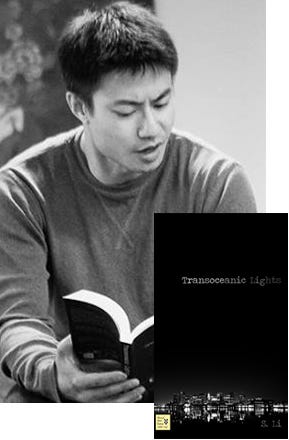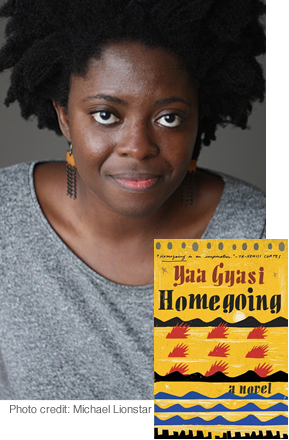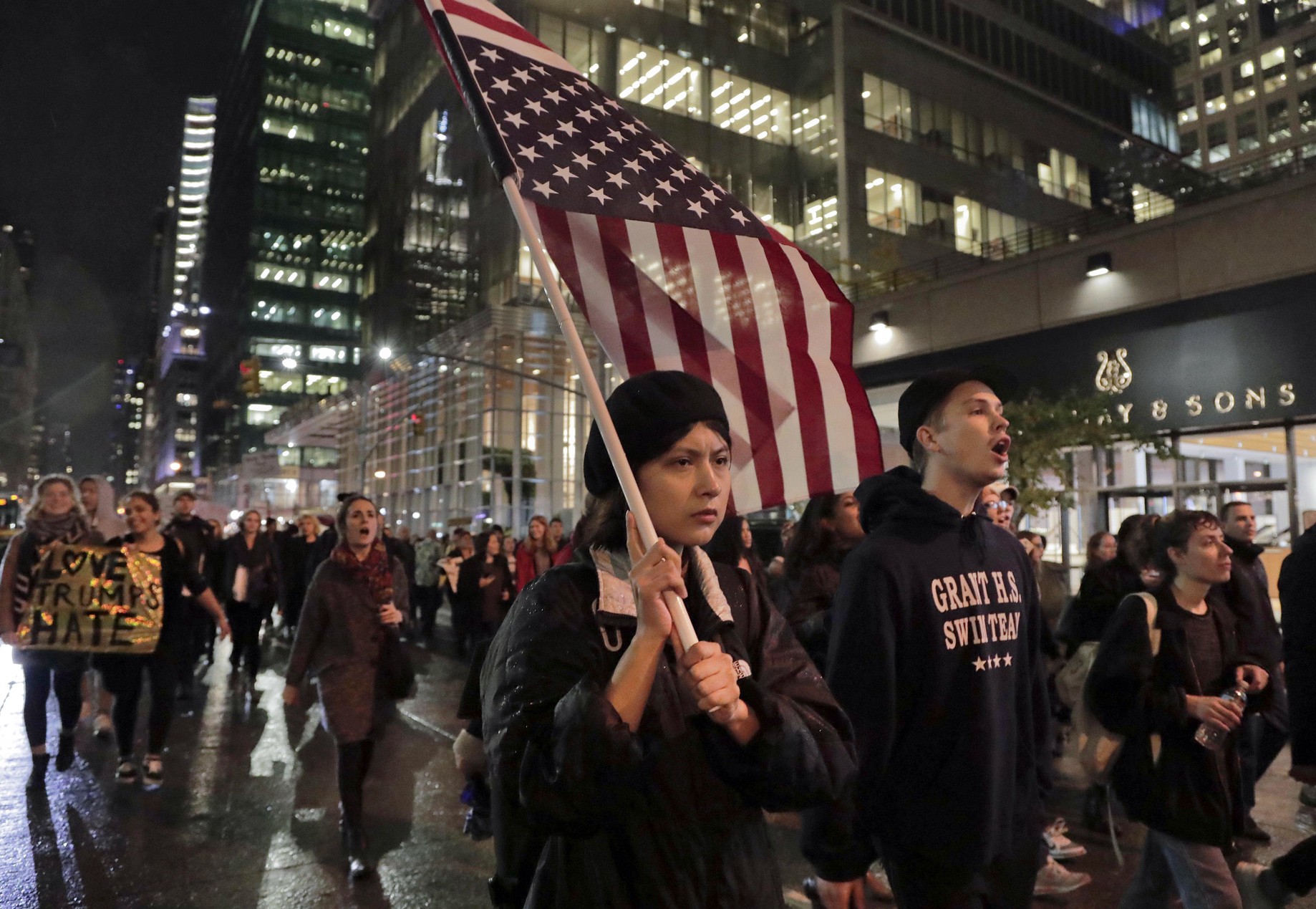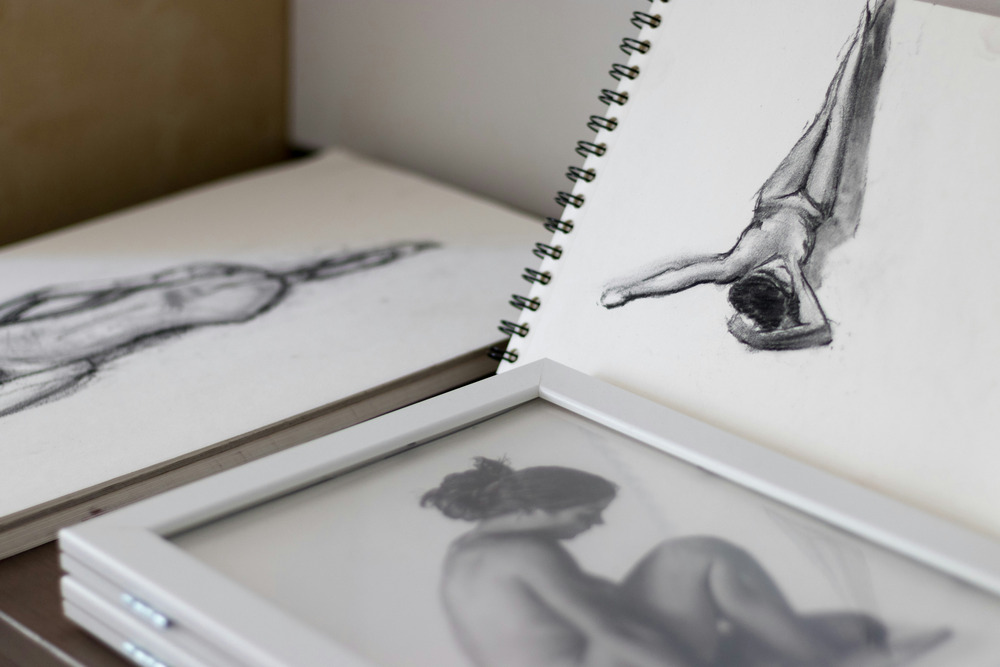essays
Read Excerpts from the National Book Foundation’s 5 Under 35 Winners
Fiction from Brit Bennett, S. Li, Yaa Gyasi, Thomas Pierce, and Greg Jackson

Each year, the National Book Foundation honors five debut fiction writers under the age of thirty-five years whose work “promises to leave a lasting impression on the literary landscape.” The winners are selected by previous National Book Award winners and finalists. We’re excited to present excerpts from each of the five winners from 2016: Brit Bennett, S. Li, Yaa Gyasi, Thomas Pierce, and Greg Jackson.
Read them, and then check out their books!

From The Mothers by Brit Bennett
In the darkness of the club, you could be alone with your grief. Her father had flung himself into Upper Room. He went to both services on Sunday mornings, to Wednesday night Bible study, to Thursday night choir practice although he did not sing, although practices were closed but nobody had the heart to turn him away. Her father propped his sadness on a pew, but she put her sad in places no one could see. The bartender shrugged at her fake ID and mixed her a drink and she sat in dark corners, sipping rum-and-Cokes and watching women with beat bodies spin on stage. Never the skinny, young girls — the club saved them for weekends or nights — just older women thinking about grocery lists and child care, their bodies stretched and pitted from age. Her mother would’ve been horrified at the thought — her in a strip club, in the light of day — but Nadia stayed, sipping the watery drinks slowly. Her third time in the club, an old black man pulled up a chair beside her. He wore a red plaid shirt under suspenders, gray tufts peeking out from under his Pacific Coast Bait & Tackle cap.
“What you drinkin’?” he asked.
“What’re you drinking?” she said.
He laughed. “Naw. This a grown man drink. Not for a little thing like you. I’ll get you somethin’ sweet. You like that, honey? You look like you got a sweet tooth.”
He smiled and slid a hand onto her thigh. His fingernails curled dark and long against her jeans. Before she could move, a black woman in her forties wearing a glittery magenta bra and thong appeared at the table. Light brown streaked across her stomach like tiger stripes.
“You leave her be, Lester,” the woman said. Then to Nadia. “Come on, I’ll freshen you up.”
“Aw, Cici, I was just talkin’ to her,” the old man said.
“Please,” Cici said. “That child ain’t even as old as your watch.”
She led Nadia back to the bar and tossed what was left of her drink down the drain. Then she slipped into a white coat and beckoned for Nadia to follow her outside. Against the slate gray sky, the flat outline of the Hanky Panky seemed even more depressing. Further along the building, two white girls were smoking and they each threw up a hand when Cici and Nadia stepped outside. Cici returned the lazy greeting and lit a cigarette.
“You got a nice face,” Cici said. “Those your real eyes? You mixed?”
“No,” she said. “I mean, they’re my eyes but I’m not mixed.”
“Look mixed to me.” Cici blew a sideways stream of smoke. “You a runaway? Oh, don’t look at me like that. I won’t report you. I see you girls come through here all the time, looking to make a little money. Ain’t legal but Bernie don’t mind. Bernie’ll give you a little stage time, see what you can do. Don’t expect no warm welcome though. Hard enough fighting those blonde bitches for tips — wait till the girls see your light-bright ass.”
“I don’t want to dance,” Nadia said.
“Well, I don’t know what you’re looking for but you ain’t gonna find it here.” Cici leaned in closer. “You know you got see-through eyes? Feels like I can see right through them. Nothin’ but sad on the other side.” She dug into her pocket and pulled out a handful of crumpled ones. “This ain’t no place for you. Go on down to Fat Charlie’s and get you something to eat. Go on.”
Nadia hesitated, but Cici dropped the bills into Nadia’s palm and curled her fingers into a fist. Maybe she could do this, pretend she was a runaway, or maybe in a way, she was. Her father never asked where she’d been. She returned home at night and found him in his recliner, watching television in a darkened living room. He always looked surprised when she unlocked the front door, like he hadn’t even noticed that she’d been gone.
Published by arrangement with Riverhead Books, an imprint of Penguin Publishing Group, a division of Penguin Random House LLC. Copyright © 2016 by Brit Bennett.
You can read another excerpt from The Mothers in Electric Literature’s Recommended Reading.

From Transoceanic Lights by S. Li
I told her how I hit my head once against the corner of our mailbox on the way back from dim sum, and I cried and cried . . . I remembered the clink of chopsticks on porcelain bowls, bamboo baskets stacked in towers wheeled along in steaming metal carts, each kind of food written in red calligraphy on white rectangles and shouted out by waitresses: shrimp dumplings, spicy tripe, phoenix talons (chicken feet), preserved duck egg and pork congee, and honeyed tofu. Ma and Ba were arguing, and I complained that I was too tired to walk. There were no seats on the ferry so I had to stand. There were no poles within reach so I had to hold on to Ma’s dress. I was careful not to step on the foot of the gaunt hunchbacked man whose chapped big toe, earthen brown, and crowned with a blistered yellow nail protruded from his tattered shoe like a hatching alien; I could not stop looking at it, at its sparse crinkled hairs like the legs of a dead spider. Don’t depend on others and learn to do things yourself, Ma shouted. You can walk, let’s go . . . but before she could finish, Ba snatched me up in his arms defiantly and carried me the rest of the way home. We approached the foot of the stairs, up the first step, up the second, then a deafening scream, my eyes squeezed shut and the darkness was spinning around me. Not doing something helpful? Then don’t do anything at all! Ma screamed as Ba lowered me to the floor to check my head. She grabbed my arm and pulled me up the stairs. She boiled an egg, peeled it, removed the yolk and put in its place a silver ring. Then she wrapped the egg in a handkerchief and rolled it over the bruise on the back of my head, tender and bubble-soft as if ready to pop. She fed the egg to the cat afterwards and showed me the ring. Its once shining surface was no longer silver but a swirl of deep blue and purple. The ring sucked out all the bruised blood, she said. Another memorable bruise was the one I got after I somersaulted off the couch out of sheer boredom and landed on the ground smack on the left side of my forehead — that was not until years later at a new apartment, and that time I did not cry. The bruise swelled and subsided, leaving behind a hardened lump noticeable in select angles of lighting that later distorted the fit of baseball hats. And then there was the bruise in the middle of May’s forehead: she was standing on the bed against the window watching the blizzard as if in deep meditation with hands pressed against the cold glass that afforded a silvery myopic view of the city — the rooftops of its skyscrapers shrouded in clouds, its roads unplowed and devoid of cars, its sidewalks unmarred by footprints, its trees coated with snow like sweet frosting — and I, lying between her feet and the window, rolled over. She toppled and gave a laugh, her knees dug into my side, and her forehead slammed into the window frame. The bruise came and went but the scar came and stayed, a canyon-like sliver visible every time she smiled . . . Ba took the blame for it by telling Ma that he had dropped the telephone on her when she was sleeping in his arms; as ridiculous and comical as that sounded, it was the truth she knew until I told her the real truth many years later when I would no longer get in trouble for it.
At the start of class, Mrs. Lin handed us a printout. Follow as closely as you can, I know most of you can’t read it, but just follow along. When you do this enough, you’ll have it memorized.
All the students were lined up by height, shortest to tallest, facing out from each classroom, hands placed over our hearts. The loudspeaker in the ceiling sounded and the principal’s voice was heard. We followed her recitation: I pledge allegiance to the Flag . . .
. . . dangling motionless from a hollow dowel jutting out from a stone column . . .
. . . and to the Republic . . .
. . . my worries had temporarily settled for I had realized that, even in extreme pain, one could be free from fear . . . would I be able to recall my beating with that same shrug of a shoulder? . . .
. . . one Nation under God . . .
. . . I pretended to mouth the syllables of the verses spoken too fast . . .
. . . and justice for all.
I half-followed the morning lessons and half-watched from some impossible vantage point our things being sold off or given away: one olive-colored couch, four black-streaked stools, one mahjong table, one video cassette recorder, one television with dust-matted antenna, one small folding dinner table with three warped plastic chairs, one hardwood bed, two lamps, one dented dresser with five drawers, one shiny red motorcycle, and the refrigerator we left behind — imagine if it were to slip from grip and cartwheel down the stairs rending apart walls, it would rock the earth on impact . . . once in the middle of the night, I remembered, or possibly dreamed, that for a few seconds a tremor in the ground woke me and sent me running to the living room to see our balcony rise and fall like a ferry on stormy waters against the backdrop of thousand-punctured skies bleeding silver . . . another time — a dream for sure — there was a quake of such magnitude that our furniture was uprooted, the walls collapsed, the doorframe cracked, the stairs shattered, yet there were no screams, for everyone had fled, and the centipedes, termites, ants, geckos, and mice were pouring out of the crevices and fissures to hurl themselves over the balcony in one big vermin waterfall . . . I rode on their slimy backs all the way to Grandfather’s house for refuge.
Published with permission from Harvard Square Editions. No part of this excerpt may be reproduced or reprinted without permission in writing from the publisher.

From Homegoing by Yaa Gyasi
Effia
The night Effia Otcher was born into the musky heat of Fanteland, a fire raged through the woods just outside her father’s compound. It moved quickly, tearing a path for days. It lived off the air; it slept in caves and hid in trees; it burned, up and through, unconcerned with what wreckage it left behind, until it reached an Asante village. There, it disappeared, becoming one with the night.
Effia’s father, Cobbe Otcher, left his first wife, Baaba, with the new baby so that he might survey the damage to his yams, that most precious crop known far and wide to sustain families. Cobbe had lost seven yams, and he felt each loss as a blow to his own family. He knew then that the memory of the fire that burned, then fled, would haunt him, his children, and his children’s children for as long as the line continued. When he came back into Baaba’s hut to find Effia, the child of the night’s fire, shrieking into the air, he looked at his wife and said, “We will never again speak of what happened today.”
The villagers began to say that the baby was born of the fire, that this was the reason Baaba had no milk. Effia was nursed by Cobbe’s second wife, who had just given birth to a son three months before. Effia would not latch on, and when she did, her sharp gums would tear at the flesh around the woman’s nipples until she became afraid to feed the baby. Because of this, Effia grew thinner, skin on small birdlike bones, with a large black hole of a mouth that expelled a hungry cry which could be heard throughout the village, even on the days Baaba did her best to smother it, covering the baby’s lips with the rough palm of her left hand.
The villagers began to say that the baby was born of the fire, that this was the reason Baaba had no milk. Effia was nursed by Cobbe’s second wife, who had just given birth to a son three months before. Effia would not latch on, and when she did, her sharp gums would tear at the flesh around the woman’s nipples until she became afraid to feed the baby. Because of this, Effia grew thinner, skin on small birdlike bones, with a large black hole of a mouth that expelled a hungry cry which could be heard throughout the village, even on the days Baaba did her best to smother it, covering the baby’s lips with the rough palm of her left hand.
“Love her,” Cobbe commanded, as though love were as simple an act as lifting food up from an iron plate and past one’s lips. At night, Baaba dreamed of leaving the baby in the dark forest so that the god Nyame could do with her as he pleased.
Effia grew older. The summer after her third birthday, Baaba had her first son. The boy’s name was Fiifi, and he was so fat that sometimes, when Baaba wasn’t looking, Effia would roll him along the ground like a ball. The first day that Baaba let Effia hold him, she accidentally dropped him. The baby bounced on his buttocks, landed on his stomach, and looked up at everyone in the room, confused as to whether or not he should cry. He decided against it, but Baaba, who had been stirring banku, lifted her stirring stick and beat Effia across her bare back. Each time the stick lifted off the girl’s body, it would leave behind hot, sticky pieces of banku that burned into her flesh. By the time Baaba had finished, Effia was covered with sores, screaming and crying. From the floor, rolling this way and that on his belly, Fiifi looked at Effia with his saucer eyes but made no noise.
Cobbe came home to find his other wives attending to Effia’s wounds and understood immediately what had happened. He and Baaba fought well into the night. Effia could hear them through the thin walls of the hut where she lay on the floor, drifting in and out of a feverish sleep. In her dream, Cobbe was a lion and Baaba was a tree. The lion plucked the tree from the ground where it stood and slammed it back down. The tree stretched its branches in protest, and the lion ripped them off, one by one. The tree, horizontal, began to cry red ants that traveled down the thin cracks between its bark. The ants pooled on the soft earth around the top of the tree trunk.
And so the cycle began. Baaba beat Effia. Cobbe beat Baaba. By the time Effia had reached age ten, she could recite a history of the scars on her body. The summer of 1764, when Baaba broke yams across her back. The spring of 1767, when Baaba bashed her left foot with a rock, breaking her big toe so that it now always pointed away from the other toes. For each scar on Effia’s body, there was a companion scar on Baaba’s, but that didn’t stop mother from beating daughter, father from beating mother.
Matters were only made worse by Effia’s blossoming beauty. When she was twelve, her breasts arrived, two lumps that sprung from her chest, as soft as mango flesh. The men of the village knew that first blood would soon follow, and they waited for the chance to ask Baaba and Cobbe for her hand. The gifts started. One man tapped palm wine better than anyone else in the village, but another’s fishing nets were never empty. Cobbe’s family feasted off Effia’s burgeoning womanhood. Their bellies, their hands, were never empty.
In 1775, Adwoa Aidoo became the first girl of the village to be proposed to by one of the British soldiers. She was light-skinned and sharp-tongued. In the mornings, after she had bathed, she rubbed shea butter all over her body, underneath her breasts and between her legs. Effia didn’t know her well, but she had seen her naked one day when Baaba sent her to carry palm oil to the girl’s hut. Her skin was slick and shiny, her hair regal.
The first time the white man came, Adwoa’s mother asked Effia’s parents to show him around the village while Adwoa prepared herself for him.
“Can I come?” Effia asked, running after her parents as they walked. She heard Baaba’s “no” in one ear and Cobbe’s “yes” in the other. Her father’s ear won, and soon Effia was standing before the first white man she had ever seen.
“He is happy to meet you,” the translator said as the white man held his hand out to Effia. She didn’t accept it. Instead, she hid behind her father’s leg and watched him.
He wore a coat that had shiny gold buttons down the middle; it strained against his paunch. His face was red, as though his neck were a stump on fire. He was fat all over and sweating huge droplets from his forehead and above his bare lips. Effia started to think of him as a rain cloud: sallow and wet and shapeless.
Excerpted from Homegoing by Yaa Gyasi. Copyright © 2016 by Yaa Gyasi. All rights reserved. No part of this excerpt may be reproduced or reprinted without permission in writing from the publisher.

From Hall of Small Mammals: Stories by Thomas Pierce, excerpted from the story “Hot Air Balloon Ride for One”
People are always asking her if she’s the F. 0. Betts. She’s not.
“Then who am I talking to?” The man on the other end of the phone line asks her this.
She shouldn’t have answered the phone. She doesn’t know why she did. She could have locked the doors and been gone an hour ago. Her boyfriend is probably waiting for her downtown with an apple martini and a basket of garlic bread.
‘’I’m the other F.O.,” she says. “His daughter. Fiona Orlean. My father was the real F.O.” The F was for Frank. The 0 was for Oliver. He taught French and Latin at the high school for twelve years, piloting trips on the side for extra cash before starting the F. 0. Betts Hot Air Balloon Company. Unfortunately he was also a sucker for online poker. Fiona officially took over the business five years ago when they discovered the extent of his debts.
“Is it safe?” the man on the phone asks. “Does it sway a lot? “
“I’ve been up a thousand times and not one accident ,” she says. “And no, it doesn’t really sway.”
The man says he wants to book a trip for one, please. “For one?”
“Yes, for one.”
“Usually we send larger groups up. Seven. Eight. Twelve. It’ll cost extra for just one person,” she says.
“I’ve got money.”
“That makes one of us.”
“How much for a solo trip tomorrow morning?” he asks.
She names an exorbitant sum, more than she’d usually charge, but he says okay, and she gives him the exact address where they can meet. The next morning, there they are, together in a hazy field at dawn, her tennis shoes and jean shorts wet from the tall grass and morning dew, the hulking balloon taking shape behind her. The passenger watches from a safe distance with his arms crossed. He doesn’t like the look of the basket. He asks if he should be hooked in somehow.
“To what?”
He points at the red metal crossbar that keeps the propane tanks in place.
“You’ll be fine,” she says. “Really.”
When they’re ready to go, she motions for him, but first he wants to get something out of his car. He digs around in the back- seat and produces a boom box and a small black metal cage. In- side the cage is a green-and-yellow bird.
“What’s this about?” she asks.
“This is Magnificent,” he says. “The parakeet. I thought she might enjoy the ride.”
“We don’t usually do this sort of thing,” she says, though in truth she has seen and permitted much stranger. She makes good money off the eccentrics. This one time a couple wanted to go up naked and Fiona tried to be funny by asking if she needed to go up naked too, but the couple didn’t laugh. They said, sure, if she wanted to, but Fiona stayed clothed and did her best not to look. This other time Fiona let a woman take up her easel and paints and Fiona had expected the woman to produce a beautiful land scape painting but when she snuck a glance at the work-in progress, in fact it was a bowl of cherries. The high mountain air, the woman explained when Fiona inquired, was full of good ions and encouraged creativity.
And so, looking at the parakeet, Fiona sees a new business opportunity. The bird will cost extra. Nothing personal, she says. It’s an issue of liability, of insurance.
“That’s fine.” He doesn’t even ask how much. He hands her the cage and then the boom box, and then he swings his long legs up and over the lip of the basket even though there’s a door that can open. He’s in jeans, and his shirtsleeves are rolled up tight around the elbows. He could be an accountant. Small wire glasses hover at the end of his thin, ruddy nose.
When she hits the blast valve, flames and exhaust shoot up the throat of the balloon, and he grips the edge of the basket with both hands. The balloon is a yellow one with blue horizontal stripes that Fiona bought almost five years ago from a company in South Dakota. She has two other balloons but all of them should probably be replaced soon.
Tom is her man on the ground today, her chaser. He has been around since her father ran the company. She gives him the signal, and he lets them loose. The balloon rises up fast into the warm morning air. Tom waves goodbye with a gloved hand. As the chaser, he will follow in the truck. The flame whooshes loudly overhead.
Fiona loves this part, the initial breakaway from the earth, from its interstates and box stores, from its pop songs and head- lines with question marks in them, from jorts and jeggings and every other commercial portmanteau. All of it falls away, and you are suspended, divided from it by — well, not much. A little bit of wicker.
According to her mother, Fiona was conceived up here, two thousand feet above the mountains. Counting nine months back- ward from October would place this momentous event — momentous for her, anyway — in January. She imagines snow on the mountains, her parents’ pink hands in gloves, boots on their feet. She imagines quilts on the bottom of the basket, their breath visible in the crisp and chilly air as they come together. The story might not be true. It doesn’t matter. Fiona likes it. Whenever she asks her father about it, he says he doesn’t remember but he says it with a smile that suggests he remembers every single detail and is just not willing to share. Usually her mother only brings it up when Fiona isn’t listening. When she acts far away. When she’s got a head full of hot air.
Her passenger doesn’t seem to be enjoying the view. He’s down in a crouch on one knee talking to the parakeet.
“What are you telling it?”
“It’s a she,” he says. “And I’m asking how she likes it up here.”
Published by arrangement with Riverhead Books, an imprint of Penguin Publishing Group, a division of Penguin Random House LLC. Copyright © 2015 by Thomas Pierce.
You can read another story by Thomas Pierce in Electric Literature’s Recommended Reading.

From Prodigals: Stories by Greg Jackson, excerpted from the story “Metanarrative Breakdown”
The thing that happens to me most profoundly on psychedelics, the reason I occasionally do them, in fact, and what happened to me that afternoon for a good two hours or so during the deepest part of the trip, is that my sense of connection to the metanarrative deserts me. Maybe it’s more accurate to say that in seeing the possibility of this connection foreclosed, I become aware of something I didn’t know was taking place: an unconscious process, a limbic subroutine, an autonomic checking-in the brain seems regularly perform to square what you are doing with the context of the day, the week, the still broader context of the year, your life, what you care about and hope to achieve, how you see yourself and how you want to be seen. It is in watching this process break down that you become conscious of it, the failure of some mechanism to catch at the appropriate point, and the sensation is not unlike waking repeatedly from a dream without having realized you were asleep.
This has been my experience, in any case, and it isn’t exactly pleasant. It is instructive though, I think, to step outside future-directed life, to feel the past slip away, and to confront who you are unmoored from history and intention. It can be frightening. You’re left with very little when these things go. But it opens some brief window on the phenomenology of being alive, of living inside a head, and it offers a fleeting glimpse of the metanarrative unmasked as demiurge, as idol, which if you’re like me you must punish from time to time, smash and sweep from the Ka’aba. The pristine emptiness, when you’ve done this, can verge on holiness.
The worst part of a trip, we can probably all agree, is the moment you’ve come down enough to realize you are not down all the way. Gabrielle and I are throwing a Frisbee in the yard, watching it glimmer metallic shades as it zips between us, when this moment comes. Gaby lets the Frisbee fall behind her without making any effort to catch it.
“I’m going to do yoga now,” she says.
“OK,” I say, and because I dislike even thinking about yoga, I decide to take a walk instead chatting with Gaby while she limbers up. I put on a shirt. I get my phone, some earbuds. I pick out a podcast to listen to. I feel briefly lucid as I set off down the street. It is a lightly wooded residential street with a few people out front watering their lawns. The occasional car passes slowly by. Once I see the people on their lawns and in their cars, however, and realize they see me, I am flooded with the certainty that they knew I’m on drugs, which now that I’ve left the equivocal sphere of the house it seems I really am. But I compel myself to focus on the podcast, on Terry Gross’s familiar voice, her warm, brisk personality, and for about ten seconds I feel fine. I manage to smile at a father and daughter playing catch without, I believe, appearing unambiguously psychotic. And yet I can feel a small worry taking shape in me, a worry I can tamp down but not entirely ignore, and which takes the form of the following question posed to myself: Haven’t I been walking on this street for an insanely long time? The right way to put it is that I have no idea how long I’ve been walking on the street, and being unable to reconstruct the experience with any temporal dimensionality feels akin to having been always walking on the street. It is not a long street, I know this for a fact. In either direction it runs into a perpendicular street and ends, measuring, along its entire length, at most eight hundred feet, a distance a world-class sprinter could cover in under twenty-five seconds. But because my walk is an iterative action and not a coherent experience — because it is not a walk so much as all the component parts of a walk — it does not seem possible, or at least inevitable, that I will ever reach the end of the street. And the more anxious this realization makes me, the more closely I attend my progress, the rate of which, as a consequence of this heightened attention, seems correspondingly to diminish. And it is right around this time, experiencing the first licks of panic, that I realize my walk has become Zeno’s paradox.
I don’t remember how I made it back. I must have turned around, but honestly it’s all a blur. A blur not because it went by fast, but in the sense that the recording of a voice slowed down sufficiently no longer resembles a voice. I credit Terry Gross with getting me home, the grounding cadence of her speech, a metronomic standard by which my subjective experience of time was kept from veering into a fatal adagio. And soon enough — or, you know, whenever — I found myself back in the sunny yard, watching Gabrielle articulate her body in serpentine asanas, listening to Terry interview an author I like, and then an actress I like, as happy as a puppy and at peace, because what I understood just then was that Terry Gross’s voice was the voice of the metanarrative, demotic ur-parent, Catcher in the WHYY, the call of the shepherd returning me to the pastures of solicitude and moderation, that cultural plane on which the days horrific news — ecocatastrophe, civilizational conflict, postcolonial scarring, and our legacies of violence and extortion — was not diminished or ignored but existed in a strange vaporous adjacency to yuppie mores, triumphalist life narratives, midcult art, and an anachronistic fixation on jazz, this narrow-bandwidth refugium for temperamental decency and civic virtue and a heartbreaking reasonableness that seemed less and less like the earned wisdom of life than a tragic hope lain over it.
Published with permission from Farrar, Straus and Giroux. No part of this excerpt may be reproduced or reprinted without permission in writing from the publisher.








